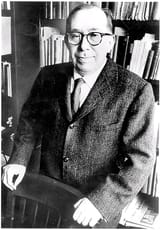Search Results
8/3/2025, 5:45:21 AM
>>24605078
>We may therefore say that Spengler's analysis and prediction is wrong: our highest authority, natural science, considers itself susceptible of infinite progress, and this claim does not make sense, it seems, if the fundamental riddles are solved. (2) If science is susceptible of infinite progress, there cannot be a meaningful end or completion of history; there can only be a brutal stopping of man's onward march through natural forces acting by themselves or directed by human brains and hands.
-Strauss, City and Man: Pg. 2
>"The experience of the present generations has taught us to read the great political literature of the past with different eyes and with different expectations. The lesson may not be without value for our political orientation. We are now brought face to face with a tyranny which holds out the threat of becoming, thanks to the "conquest of nature" and particular human nature, what no earlier tyranny ever became: perpetual and universal."
-Strauss, On Tyranny, pg. 27
>“The world state presupposes such a development of technology that Aristotle could never have dreamed of. That technological development, in its turn, required that science be regarded as essentially in the service of the “conquest of nature” and that technology be emancipated from any moral and political supervision. Aristotle did not conceive of a world state because he was absolutely certain that science is essentially theoretical and that the liberation of technology from moral and political control would lead to disastrous consequences: the fusion of science and the arts [Technology] together with the unlimited or uncontrolled progress of technology has made universal and perpetual tyranny a serious possibility."
-Strauss, in Natural Right and History, pgs. 22-23
>We may therefore say that Spengler's analysis and prediction is wrong: our highest authority, natural science, considers itself susceptible of infinite progress, and this claim does not make sense, it seems, if the fundamental riddles are solved. (2) If science is susceptible of infinite progress, there cannot be a meaningful end or completion of history; there can only be a brutal stopping of man's onward march through natural forces acting by themselves or directed by human brains and hands.
-Strauss, City and Man: Pg. 2
>"The experience of the present generations has taught us to read the great political literature of the past with different eyes and with different expectations. The lesson may not be without value for our political orientation. We are now brought face to face with a tyranny which holds out the threat of becoming, thanks to the "conquest of nature" and particular human nature, what no earlier tyranny ever became: perpetual and universal."
-Strauss, On Tyranny, pg. 27
>“The world state presupposes such a development of technology that Aristotle could never have dreamed of. That technological development, in its turn, required that science be regarded as essentially in the service of the “conquest of nature” and that technology be emancipated from any moral and political supervision. Aristotle did not conceive of a world state because he was absolutely certain that science is essentially theoretical and that the liberation of technology from moral and political control would lead to disastrous consequences: the fusion of science and the arts [Technology] together with the unlimited or uncontrolled progress of technology has made universal and perpetual tyranny a serious possibility."
-Strauss, in Natural Right and History, pgs. 22-23
Page 1
